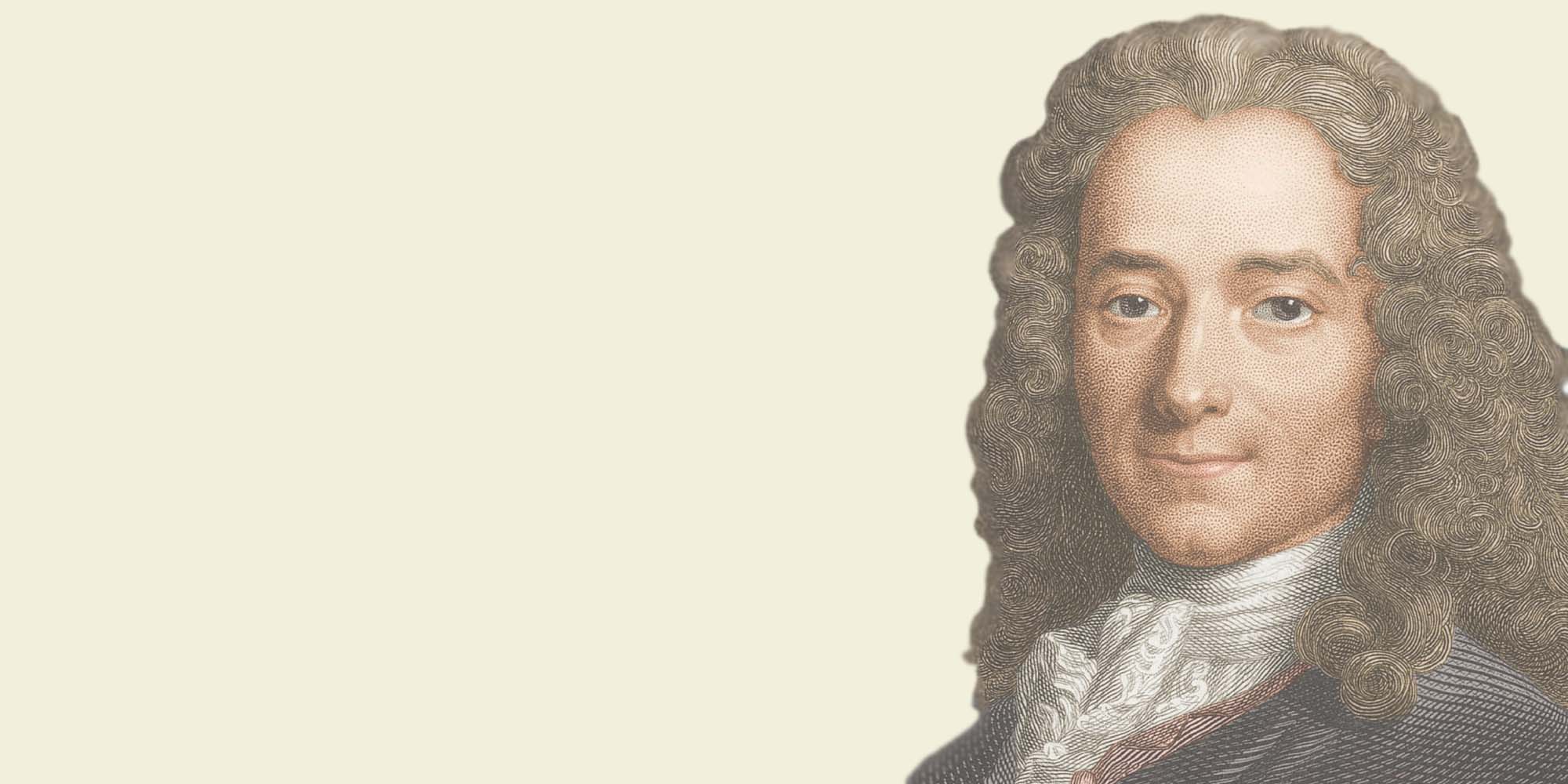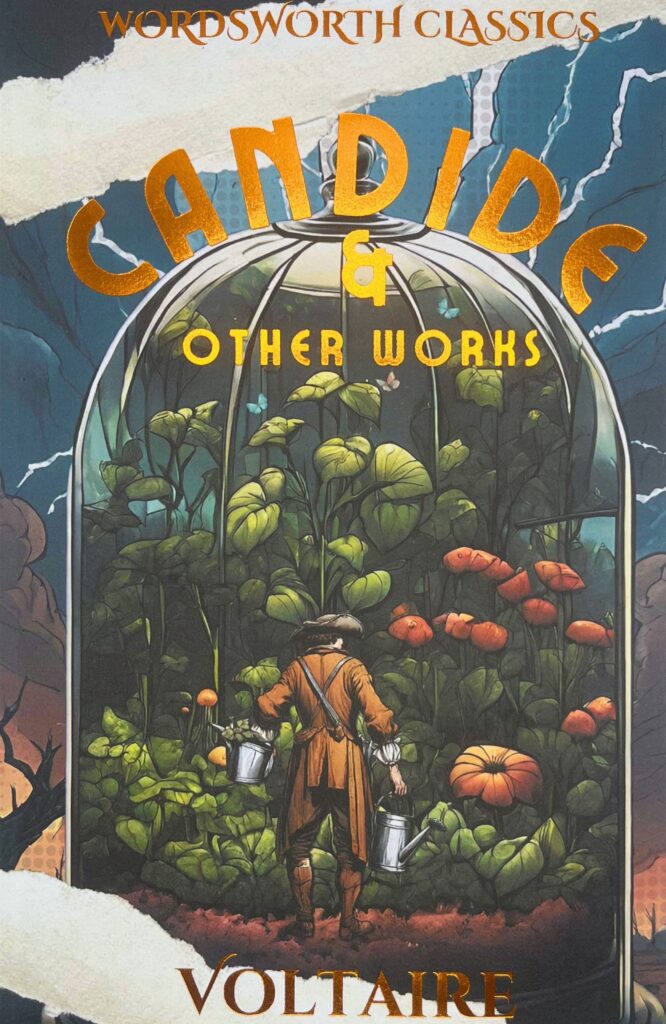
David Stuart Davies looks at Candide
David Stuart Davies looks at Candide, the best-known work of the prolific French novelist Voltaire.
Candide (1759) is a bright, colourful literary firework display of a novella. With cunning wit and biting satire, Voltaire (1694 -1778) exposes many truths about man’s condition. The author’s main target for criticism is to lampoon the philosophical stance perpetrated by the German philosopher Gottfried Wilhelm Leibniz whose theory was that our Universe is the best possible one that God could have created, an optimistic viewpoint that leads man to be self-satisfied and indolent, accepting the Leibnizian mantra that ‘all is for the best in the best of all possible worlds’. Through this rite of passage story, with the central character Candide, a naïve and impressionable young man, Voltaire attacks and ridicules this theory.
The novella, which was originally published in French, begins with Candide living a sheltered existence, brought up in the household of a powerful Baron. Candide is an open-minded innocent, whose tutor, Pangloss, has instilled in him the belief that we must take what life offers us without question, for ‘all is for the best’. Voltaire cleverly emphasises the nature of these two characters in their names: Candide from the Latin ‘candidus’ meaning ‘white’ for the pure and innocent protagonist; and ‘Pangloss’ meaning ‘all-tongue’ for the blabbing philosopher.
When Candide’s love for the Baron’s rosy-cheeked daughter is discovered, much to the father’s rage, the young man is cast out to make his own way in the world. It is now that he experiences the realities of life, leading him to a slow and painful disillusionment as he witnesses and undergoes great hardships, so different from his secure and pampered existence in the Baron’s castle.
Along with various companions, Candide begins a breathless tour of Europe, South America and Asia, as an outrageous series of disasters befall them – earthquakes, syphilis, a brush with the Inquisition, murder – all sorely testing the young hero’s optimism. The story moves at an exciting pace, carrying the reader along as though enjoyed on a speedy fairground ride. Candide does not try to be a realistic novel: the narrative proceeds by means of incredible coincidences and enormous reversals of fortune; characters are left for dead, and then improbably revived a few pages later when the argument requires their recall. In this genre, the participants are even more subject than usual to the whims of the puppeteer-novelist, who requires them to be here to demonstrate this, and there to demonstrate that.
Although his painful experiences in the real, and in Voltaire’s assessment, the cruel world gradually erodes Candide’s optimistic belief, he and his companions display an instinct for survival that gives them hope in an otherwise sombre setting. At the conclusion of the novel, they all retire together to a simple life on a small farm and it is here that they discover that the secret of happiness is ‘to cultivate one’s garden,’ a practical philosophy that excludes excessive idealism. The message is quite simply timeless. While this tale has a strong philosophical message, it is also remarkably entertaining – a rare combination of elements that bear witness to the brilliance of the author.
Candide is presented as a kind of pilgrim who makes a progress as a result of the catalogue of calamities inflicted upon him by the author; but those around him including the deluded Pangloss, remain as they are when first presented. Pangloss, despite relentless evidence against his Leibnitzian view that the world demonstrates a ‘pre-established harmony’, is defiantly foolish to the end: ‘I have always abided by my first opinion . . . for, after all, I am a philosopher; and it would not become me to retract my sentiments.’
Voltaire’s purpose behind Candide was influenced by various atrocities of the mid-18th century, most notably the devastating Lisbon earthquake of 1755, the outbreak of the horrific Seven Years’ War in the German states, and the unjust execution of the English Admiral John Byng for failing to relieve the naval base at Minorca from a French siege. (This episode provoked Voltaire to remark in Candide that the English found it necessary from time to time to shoot an admiral ‘pour encourager les autres’ – ‘in order to encourage the others’).
Candide is often hailed as an ironic attack on the optimistic beliefs of the Enlightenment, the intellectual and philosophical movement which proffered a range of ideas centred on reason as the primary source of authority and legitimacy. Voltaire’s critique is directed at Leibniz’s principle of sufficient reason, which maintains that nothing can be so without there being a reason why it is so. The consequence of this principle is the belief that the actual world must be the best one humanly possible.
Initially, the book was published privately, but when it reached a wider audience, the French authorities banned it because it was considered that contained religious blasphemy, political sedition, and intellectual hostility hidden under a thin veil of naïveté. Nevertheless, Candide succeeded in selling twenty to thirty thousand copies by the end of the year in over twenty editions, making it a best seller. Remarkably the book was banned in the United States until the early years of the twentieth century.
The operetta Candide was originally conceived by playwright Lillian Hellman as a play with incidental music. Leonard Bernstein, the American composer and conductor who wrote the music, was so excited about the project that he convinced Hellman to adapt it as a ‘comic operetta’. Many lyricists worked on the show, including James Agee, Dorothy Parker and Stephen Sondheim. Candide first opened on Broadway on 1 December 1956. The initial production was directed by Tyrone Guthrie. While this production was a box office flop, the music was highly praised, and the original cast album gradually became a cult hit.
The BBC produced a television adaptation for their Play of the Month series in 1973, with Ian Ogilvy as Candide and Frank Finlay as Voltaire himself, acting as the narrator.
The fascination with Voltaire’s masterpiece continues. For example, In May 2009, a play called Optimism, based on the novella opened at the Malthouse Theatre in Melbourne. It followed the basic storyline of Candide, incorporating anachronisms, music and stand-up comedy from comedian Frank Woodley. It later toured Australia and played at the Edinburgh International Festival. The various theatrical and literary interpretations of this caustic and comic satire of the social ills of its day, clearly demonstrate that Candide’s reflections remain as pertinent now as ever.
Books associated with this article
